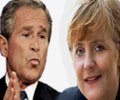
Nov 12: The Doha round negotiation which begun in 2001 in Doha, still continues to stir the World Trade Organisations (WTO) member nations.
Its objective is to lower trade barriers around the world, permitting free trade between countries. The member nation remain divided on various issue related to Doha round.
United States in its message has urged that both the developed and developing nations should work closely to press forward the Doha Round.
"We had a very good discussion on Doha, and the need for Germany and Europe and the US to work closely together with developing nations such as Brazil and India to advance the Doha Round," President George W Bush said at a joint Press Availability with the German Chancellor Merkel in Crawford.
"I appreciated very much the Chancellor's briefing on her trip to India. It helps a lot for those of us who are engaged in international politics to get advice from people who have seen firsthand the attitudes and -- of important players such as India," Bush said.
"The President raised this issue also with me of the world trade round. We then also discussed the issue of the UN reform of the Security Council, and there we do think that it will be necessary to have further exchanges on that particular issue, and we do hope that -- some progress has been made already in this respect, and we hope further progress will be underway. We're going to continue to talk about that," Chancellor Merkel said in her comments.
Developed nation led by European Union, United States and Japan while developing nations led by India, China, Brazil and South Africa are negotiating on agricultural and manufacturing issues, services and various issues related to intellectual property rights. This negotiation is to provide fairer deal in trade rules to developing nations.
Rich countries farm subsidies became one of the major issues as it distorts the domestic policy of other developing countries.
Since then, negotiation on the same has echoed in all other conferences of WTO.
Finally in 2004 in Geneva Convention a framework agreement was achieved including ending the export subsidies, reducing agricultural subsidies and lower tariff barriers by US , EU and Japan while developing nations agreed to reduce tariffs on manufactured goods, but had the right to specifically protect the key industries.
But still the matter is hanging and in 2005 Hong Kong convention the trade ministers of many countries reached a deal that sets a deadline for eliminating subsidies of agricultural exports by 2013.
The July 2006 round in Geneva failed to reach any agreement about reducing farming subsidies and lowering import taxes.
This negotiation has failed to reach a conclusion after 6 long years with disagreement mainly in opening agricultural and industrial markets in various countries and also keeping away the rich nation out of subsidies.
The cloud on this negotiation has become darker and darker with Bush term expiring in 2007 and in this case any trade pact will have to approve by the US congress with the possibility of amendments which will create an additional burden on the US negotiators.
|
|
Read More: South Goa


Comments: